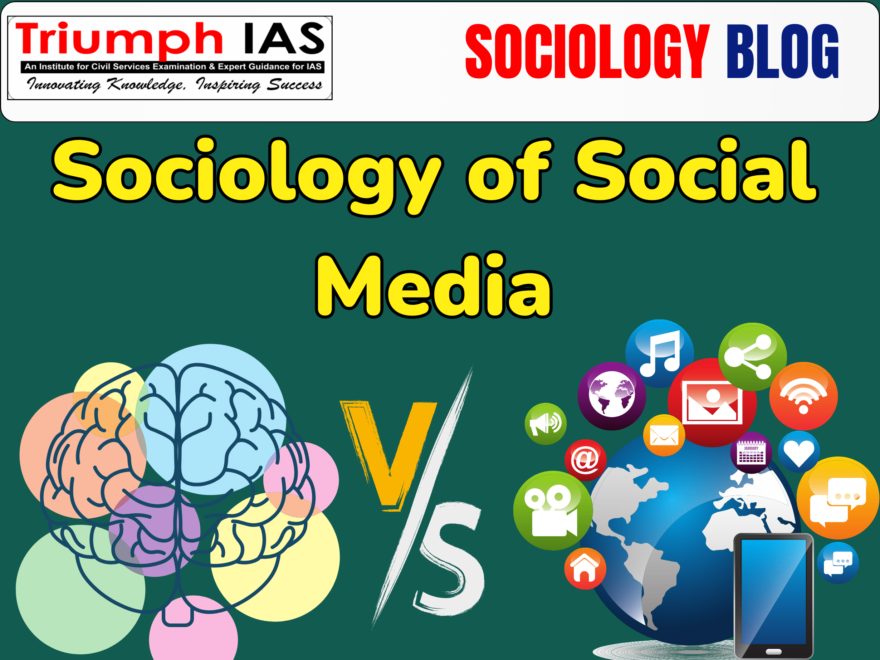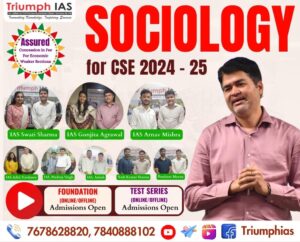Sociology of Social Media
Relevant for Sociology Optional for Civil Service Examination.
Paper 1: Science , Technology And Social Change
Paper 2: Vision Of Social Change In India
Sociology of Social Media
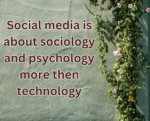
Sociology of Social Media
- Functional analysis, involves examining the functions of various elements within a social system. In the case of social networking sites, functionalists would analyse both manifest and latent functions to understand how these platforms contribute to the maintenance and potential disruption of the social order. Here’s a breakdown:
According to INDIA INTERNET REPORT
57 per cent of all new users of internet in 2022 |
- Manifest Functions:
-
- Facilitation of Connections: Social networking sites serve as a platform for individuals to connect with family, friends, and other acquaintances, promoting social ties and relationships.
- Interest-based Discussions: These platforms support discussions about hobbies and interests, bringing together like-minded individuals who might not have connected otherwise.
- Expanded Social Circles: Social networking sites allow users to establish and maintain contacts with a larger number of people than traditional non-digital means.
- Latent Functions:
-
- Reconnection Tool: Users can reconnect with lost contacts, including long-lost relatives, which may not have been easily achievable without these digital platforms.it can enhance solidarity both mechanical and organic.
- Law Enforcement Tool: Social networking sites can be used by law enforcement to collect evidence and information, potentially aiding in criminal investigations.
- Character Assessment: Employers and others can use posted content to gather information about an individual’s character, extending beyond the traditional resume and interview process.
- Manifest Dysfunction:
-
- Identity Fabrication: A manifest dysfunction of social networking sites is the challenge of determining whether the information presented in user profiles is authentic or fabricated. This can lead to issues such as false attributions, as seen in the example of teens posting embarrassing material under the name of a disliked teacher. It can hamper social harmony.
- Latent Dysfunction:
-
- Loss of Control over Content: Once content is posted on social networking sites, users lose control over how it may be used or interpreted. This latent dysfunction can have consequences, as information may be misused or misunderstood. This can create sense of alienation and identity crisis.
- Conflict perspective: The conflict perspective focuses on the creation and reproduction of inequality—social processes that tend to disrupt society rather than contribute to its smooth operation.
- When we take a conflict perspective, one major focus is the differential access to media and technology embodied in the digital divide. Conflict theorists also look at who controls the media , for example how media promotes the norms of upper-middle-class white people in the United States while minimizing the presence of the working class, especially people of color.
- Influential individuals and social institutions wield significant control over the development, timing, and accessibility of various technologies, as well as the content available for public consumption—a phenomenon characterized as Shoemaker and Voss (2009) articulate gatekeeping as a crucial sorting process where the multitude of potential messages is moulded into a form suitable for mass media and condensed to a manageable volume.
- Essentially, those in authoritative elite positions within the media determine what information the public is exposed to, a dynamic that, as noted by C. Wright Mills (1956), lies at the core of the media’s influential power.
- Feminist perspective : Feminist perspective theorists argue that the creation and perpetuation of idealized images play a crucial role in the reinforcement of stereotypes.
- An illustration of this is evident in the research conducted by Fox and Bailenson (2009), who discovered that online female avatars adhering to gender stereotypes contribute to the cultivation of negative attitudes toward women.
- Additionally, Brasted (2010) found that media, especially advertising, actively promotes gender stereotypes.
- Symbolic interactionists : they offer a unique perspective by focusing on the dynamics of social interaction, emphasizing self-awareness, symbols, and the negotiated order within social contexts. When applied to the study of social networking sites like Facebook, symbolic interactionists delve into the intricacies of how individuals experience, interpret, influence, and respond to the actions and communications of themselves and others.
-
- Self-awareness and Presentation:
- Symbolic interactionists explore how individuals on social networking platforms, especially teenagers, use these platforms as a mirror to present themselves. Users actively shape and curate their online personas, seeking visibility and feedback from others.
- Symbols and Communication:
- The study involves an examination of the symbols and vocabulary employed on social networking sites. Terms like “block” (preventing contact or profile viewing) and “add” (connecting with a new friend) become crucial symbols that convey intent and mood in online interactions.
- Negotiated Order:
- Symbolic interactionists are interested in the negotiated order within social networking spaces. This includes how individuals navigate the presentation of self and seek responses from their online connections. The interactions are not fixed but are shaped through ongoing negotiation and interpretation.
- Feedback and Social Validation:
- The quest for feedback is a central theme for symbolic interactionists studying social networking platforms. Users, particularly teenagers, seek validation and acknowledgment through likes, comments, and other forms of interaction, contributing to the ongoing process of self-construction.
- Vocabulary and Symbolic Meanings:
- Understanding the unique vocabulary and symbolic meanings within social networking spaces is crucial for symbolic interactionists. Words and phrases take on nuanced meanings, and individuals engage in a shared symbolic language that influences their online interactions.
- Self-awareness and Presentation:
- The Cultural Effects Model: The Marxist cultural effects model sees media as very powerful ideological influence, mainly concerned with ideological influence.
- Philo and Beattie: argue that moral panics often arise because of negative media representations of issues such as immigration and asylum seekers.
- Bualdrillard: the border between reality and its representations has collapsed and we no longer can separate representations from reality. He has used the term hyper-reality for this situation.
- Kolker: At the keyboard and online, we seem to be in control and in intimate connection with something or someone, in a world both internal and external simultaneously.
- Howard Rheingold: he analyse role of social media in intellectual deviant activities
- People in virtual communities use words on screen to exchange pleasantries and argue, engage in intellectual discourse.
- The dark web, hidden and encrypted part of World Wide Web has been used for disturbing child pornography and other criminal activities
- Manuel Castle: Internet will enable new form of employment, individual expression and collaboration and sociability.
Reference: Static Portion
Related Blogs…
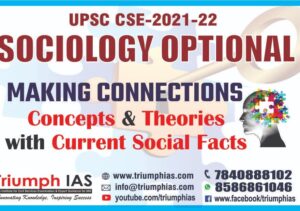 |
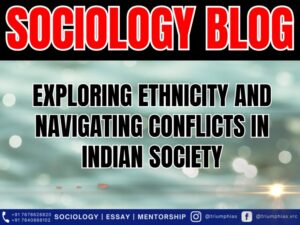 |
Frequently Asked Questions:
1. Question: Define the term “ethnic movement” and provide an example from India.
Answer: An ethnic movement refers to a collective effort by a group sharing common cultural, linguistic, or religious traits, seeking to assert their identity and rights; an example from India is the Khalistan Movement in Punjab.
2. Question: Identify the main objectives behind the Gorkhaland ethnic movement.
Answer: The Gorkhaland ethnic movement primarily seeks to establish a separate state for India’s Nepali-speaking population in the Darjeeling region, advocating for linguistic and cultural recognition and political autonomy.
3. Question: What was the Operation Blue Star, and which ethnic movement was it related to?
Answer: Operation Blue Star was a military action in 1984, aiming to remove Sikh militants hiding in the Golden Temple in Amritsar; it is related to the Khalistan movement, which sought a separate Sikh country.
4. Question: Mention a critical factor that triggered the emergence of ethnic movements in India, as discussed by Dipankar Gupta.
Answer: Dipankar Gupta emphasized that ethnicity is fundamentally a political process, wherein caste and religion, the key components of identity formation, are politicized by leaders for vested interests.
5. Question: What were the primary reasons for the Assam Ethnicity conflicts involving Bodo tribals and Bengali Muslim settlers?
Answer: The Assam Ethnicity conflicts primarily stemmed from issues related to immigration, land rights, and resource allocation, leading to clashes, riots, and evolving relationships among indigenous communities to address challenges.
6. Question: Briefly describe the role of the Dravidian Movement in terms of caste and societal structure.
Answer: The Dravidian Movement, led notably by E.V. Ramasamy, aimed to establish an egalitarian society, focusing on anti-Brahmanism and advocating for equal rights for backward castes, while also introducing reforms like self-respect marriages.
7. Question: Name the prominent ethnic movements in North-East India and specify one common objective.
Answer: Prominent ethnic movements in North-East India include the Nagas’ and Mizos’ struggles; a common objective was to gain autonomy and recognition for their distinct tribal identities and cultural uniqueness.
8. Question: What is the key argument of Gail Omveldt regarding traditional Indian society and multiculturalism?
Answer: Gail Omveldt opposed romanticizing traditional Indian society, arguing that hierarchy has always dominated it and dismissing the notion that multiculturalism is an intrinsic feature of Indian society as a myth.
9. Question: Briefly explain the social hierarchy factor as a contributing element to ethnic movements as suggested by Olzak.
Answer: Olzak suggests that the construction of hierarchies among ethnic communities, which often leads to the suppression of one group by another, is a key factor that can instigate social and ethnic movements.
10. Question: Identify one consequence of the unequal economic development factor within the context of ethnic movements in India.
Answer: One consequence of unequal economic development is the marginalization and underdevelopment of certain groups, leading to feelings of alienation and sometimes initiating ethnic movements as these groups strive for equality and recognition.
GS Related Practices Questions…
To master these intricacies and fare well in the Sociology Optional Syllabus, aspiring sociologists might benefit from guidance by the Best Sociology Optional Teacher and participation in the Best Sociology Optional Coaching. These avenues provide comprehensive assistance, ensuring a solid understanding of sociology’s diverse methodologies and techniques.
META TAGS:
Ethnic Movements, ethnic movements in india, ethnic movement in sociology, Punjab Movement, North-East Ethnic Movements, Gorkhaland Movement, Dravidian Movement, Assam Ethnicity, Ethnic Conflicts, Sociopolitical Impact, India, Ethnic Consciousness, Ethnic Rights, Political Crisis, Economic Development, Cultural Disparities, Khalistan Movement, Nagaland, Mizoram, Multiculturalism, Political Economy, Identity Formation, Social Hierarchies, Bodo Tribals, Bengali Muslim Settlers, Anti-Sikh Riots, Operation Blue Star, Unequal Development, Ethnic Violence, Political Mobilization

Why Vikash Ranjan’s Classes for Sociology?
Proper guidance and assistance are required to learn the skill of interlinking current happenings with the conventional topics. VIKASH RANJAN SIR at TRIUMPH IAS guides students according to the Recent Trends of UPSC, making him the Best Sociology Teacher for Sociology Optional UPSC.
At Triumph IAS, the Best Sociology Optional Coaching platform, we not only provide the best study material and applied classes for Sociology for IAS but also conduct regular assignments and class tests to assess candidates’ writing skills and understanding of the subject.
Choose The Best Sociology Optional Teacher for IAS Preparation?
At the beginning of the journey for Civil Services Examination preparation, many students face a pivotal decision – selecting their optional subject. Questions such as “which optional subject is the best?” and “which optional subject is the most scoring?” frequently come to mind. Choosing the right optional subject, like choosing the best sociology optional teacher, is a subjective yet vital step that requires a thoughtful decision based on facts. A misstep in this crucial decision can indeed prove disastrous.
Ever since the exam pattern was revamped in 2013, the UPSC has eliminated the need for a second optional subject. Now, candidates have to choose only one optional subject for the UPSC Mains, which has two papers of 250 marks each. One of the compelling choices for many has been the sociology optional. However, it’s strongly advised to decide on your optional subject for mains well ahead of time to get sufficient time to complete the syllabus. After all, most students score similarly in General Studies Papers; it’s the score in the optional subject & essay that contributes significantly to the final selection.
“A sound strategy does not rely solely on the popular
Opinion of toppers or famous YouTubers cum teachers.”
It requires understanding one’s ability, interest, and the relevance of the subject, not just for the exam but also for life in general. Hence, when selecting the best sociology teacher, one must consider the usefulness of sociology optional coaching in General Studies, Essay, and Personality Test.
The choice of the optional subject should be based on objective criteria, such as the nature, scope, and size of the syllabus, uniformity and stability in the question pattern, relevance of the syllabic content in daily life in society, and the availability of study material and guidance. For example, choosing the best sociology optional coaching can ensure access to top-quality study materials and experienced teachers. Always remember, the approach of the UPSC optional subject differs from your academic studies of subjects. Therefore, before settling for sociology optional, you need to analyze the syllabus, previous years’ pattern, subject requirements (be it ideal, visionary, numerical, conceptual theoretical), and your comfort level with the subject.
This decision marks a critical point in your UPSC – CSE journey, potentially determining your success in a career in IAS/Civil Services. Therefore, it’s crucial to choose wisely, whether it’s the optional subject or the best sociology optional teacher. Always base your decision on accurate facts, and never let your emotional biases guide your choices. After all, the search for the best sociology optional coaching is about finding the perfect fit for your unique academic needs and aspirations.
To master these intricacies and fare well in the Sociology Optional Syllabus, aspiring sociologists might benefit from guidance by the Best Sociology Optional Teacher and participation in the Best Sociology Optional Coaching. These avenues provide comprehensive assistance, ensuring a solid understanding of sociology’s diverse methodologies and techniques. Sociology, Social theory, Best Sociology Optional Teacher, Best Sociology Optional Coaching, Sociology Optional Syllabus.
Best Sociology Optional Teacher, Sociology Syllabus, Sociology Optional, Sociology Optional Coaching, Best Sociology Optional Coaching, Best Sociology Teacher, Sociology Course, Sociology Teacher, Sociology Foundation, Sociology Foundation Course, Sociology Optional UPSC, Sociology for IAS,
Follow us :
🔎 https://www.instagram.com/triumphias
🔎https://www.youtube.com/c/TriumphIAS
🔎https://t.me/VikashRanjanSociology
Find More Blogs…
| Compare and contrast Karl Marx’s and Max weber’s | Karl Marx- Historical Materialism |
| Talcott Parsons : Social system | Scope of the subject and comparison with other social sciences |
KEYWORD: -Sociology of Social Media,Sociology of Social Media,Sociology of Social Media,Sociology of Social Media,Sociology of Social Media,Sociology of Social Media,Sociology of Social Media ,Sociology of Social Media,Sociology of Social Media,Sociology of Social Media,Sociology of Social Media,Sociology of Social Media,Sociology of Social Media

